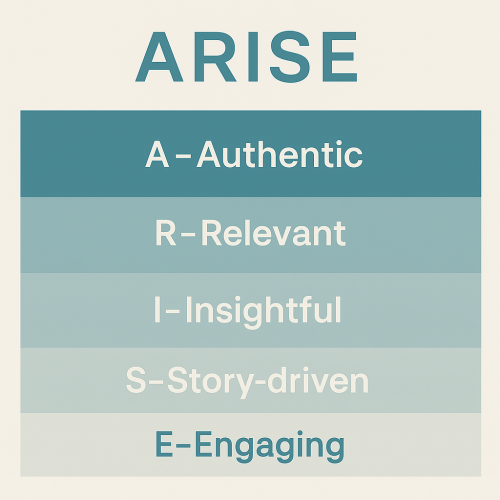As global energy transition accelerates, more Chinese new-energy companies are turning to social media as a core channel for international brand building. Yet many are still stuck in a “translation-style output” mode:
Some only list technical specs—“Efficiency: 98.6%”—without showing real application scenarios.
Others copy consumer-brand slogans—“Towards a green future”—making content feel empty and generic.
This kind of rigid content rarely triggers engagement and can even weaken professional credibility.
The real challenge is not whether to use social media, but how to deliver content that is technically strong and locally resonant.
To solve this, we introduce the ARISE Framework—a systematic model to help new-energy brands create content that is warm, trustworthy, and conversion-driven across global markets.
I. The ARISE Framework: Content That Gets Seen, Understood, and Remembered

ARISE is not a set of quick creative tricks—it is a content architecture based on the user’s cognitive journey.
It consists of five reinforcing dimensions:
A — Authentic (real-world application)
R — Relevant (local market relevance)
I — Insightful (technical depth & industry value)
S — Story-driven (human-centered narratives)
E — Engaging (designed for interaction)
Together, they form a Professional → Empathetic → Actionable content loop—allowing new-energy companies to retain technical authority while building emotional and practical connection with global audiences.
A — Authentic: Show Real Applications, Not Just Specs
Content must be anchored in real deployment scenarios.
Example:
Publishing a German-market post showing the full installation flow of a rooftop PV inverter—site inspection → rooftop mounting → VDE certification—is far more persuasive than posting a plain infographic listing “Efficiency 98.6%”.
Real environments remove abstraction and build trust.
R — Relevant: Adapt Content to Local Contexts
Content must connect to the realities of each market—its policies, climate, energy risks, or industry pain points.
Examples:
Southeast Asia: “How C&I storage reduces losses during scheduled daily power outages.”
Europe: “How grid-connection stability and CBAM carbon tariffs influence project cost.”
If content is not tied to local concerns, users won’t perceive it as “for me”.
I — Insightful: Provide Depth Beyond Marketing Slogans
Go beyond product promotion and deliver verifiable insights.
Examples:
“TCO Comparison: Liquid-Cooling vs Air-Cooling Storage in Middle Eastern High-Temperature Environments”
“How the 2025 ITC Extension Impacts Residential PV IRR in the U.S.”
Insightful content builds technical authority and industry credibility.
S — Story-Driven: Let Real People Speak for You
Stories humanize technology.
Example:
A Brazilian food-processing factory owner shares: “Since deploying your storage system, ingredient losses due to outages have dropped by 70%.”
Outcome-based storytelling creates stronger emotional connection than a 10-page product brochure.
E — Engaging: Turn Viewers Into Participants
Every post needs a clear engagement trigger—polls, questions, Q&As, challenges.
Examples:
LinkedIn poll: “What matters most in your storage evaluation? A. CapEx B. Cycle Life C. Response Time”
Instagram Stories Q&A: “Ask our engineer: Can your grid handle solar?”
Dialogue—not broadcasting—is what converts followers into leads.
II. What Works vs. What Fails: A Clear Comparison
Our experience serving many global new-energy companies shows that subtle content differences lead to dramatic performance gaps.
Dimension | Successful Content | Ineffective Content |
Format | Real “PV Installation in Germany” videos documenting survey → installation → VDE certification | Static spec posters with “98.6% efficiency / IP65 / 10-year warranty” |
Localization | Tailored to local regulations & concerns | One-size-fits-all global messaging |
User Value | Answers real project questions; shows the process end-to-end | Lists product features; no scenario context |
Performance | +120% follower growth; reposted by EPCs | Near-zero engagement; weak algorithm reach |
Risk | — | Risk of greenwashing accusations |
III. How to Implement ARISE: The Content Template Library
To make ARISE practical, we developed a New-Energy Social Media Template Library, covering the most common content formats.
Here are a few samples:
Content Type | Template Title | Recommended Platforms | Content Goal |
Customer Story | “How a Factory in [Country] Cut Energy Costs by 40%” | LinkedIn, Facebook | Build trust; demonstrate ROI |
Technical Explainer | “3 Myths About Battery Storage in Hot Climates” | LinkedIn, YouTube | Educate; break misconceptions |
Project Walkthrough | “Day 1–7: Installing Solar in [Region]” | Instagram, TikTok | Show delivery capability |
Policy Insight | “What Vietnam’s New Net Metering Rules Mean for You” | LinkedIn, Website Blog | Link to local policy; boost authority |
Interactive Q&A | “Ask Our Engineer: Can Your Grid Handle Solar?” | LinkedIn Live, Stories | Engineer branding; deeper engagement |
🎁 To download the full ARISE PDF, scan the QR code and add [言灵传播MK] on WeChat and reply [ARISE].

IV. Conclusion: Social Media Is a Dialogue, Not a Billboard
For new-energy brands, the true value of global social media isn’t exposure—it’s becoming a meaningful participant in the local energy ecosystem.
By applying the ARISE model, companies can transform technical language into content that is understandable, relatable, verifiable, and interactive—and ultimately build deeper trust with markets worldwide.
Landelion supports global content strategy & localization for new-energy, industrial tech, and smart-manufacturing companies—helping Chinese technology be accurately understood and deeply trusted worldwide.
👉 Want a customized overseas content strategy for your energy brand? Contact us to get started.




